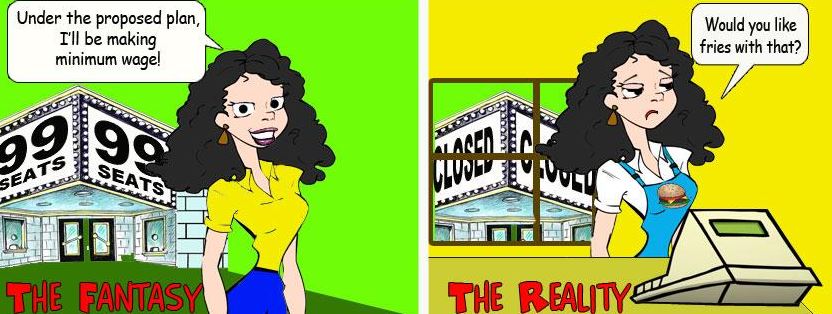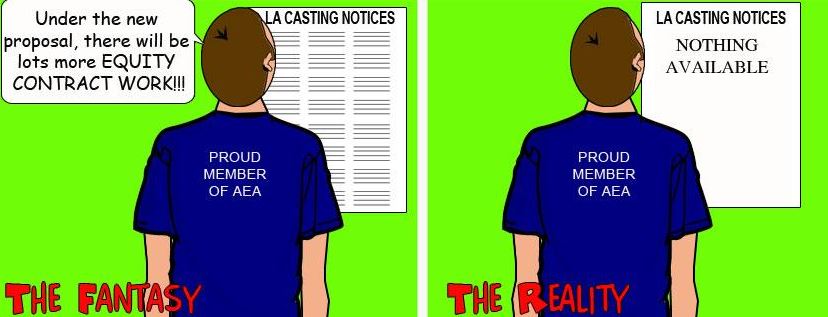Inside the Nasty Battle Over the Minimum Wage for Theater Actors

By:
For Los Angeles theater performers, acting is a labor of love, but according to the Actors' Equity Association (AEA), a union that represents stage actors, love doesn't pay the rent, at least in LA.
That's why the union has proposed eliminating exemptions in their agreement that allow small theaters of 99 or fewer seats (also known as 99-Seat theaters) to pay extremely low wages for shows and sometimes no wages at all to members of the AEA. Currently, actors can receive as little as $7 per show with no payment for rehearsal time. The new plan would pay actors California's minimum wage of $9 per hour worked, including during rehearsals.
The 99-Seat plan, which was called the Equity Waiver Agreement when it debuted in the early 1970s, allows union performers to work without a salary contract. Under the rule, actors must receive $7-$15 per show in addition to parking coverage. Deadline reports that many small theaters are considering reaching out to non-Equity actors if the proposal passes, as union actors will no longer be allowed to perform in these shows without receiving minimum wage.
Kathleen Hennessy, a spokesperson for the California State Labor Commissioner, said in an interview with Deadline that California minimum wage laws indeed apply to stage actors, "There is no such exemption for actors at non-profit theaters."
Hennessey said that the only exception goes to "learners," which is defined by law as "[e]mployees in the first 160 hours of employment in occupations in which they have no previous, similar, or related experience may be paid not less than 85 percent of the minimum wage rounded to the nearest nickel."
As Deadline put it, small theater producers have managed to violate the law for a very long time under the notion that the actors are "volunteers." It's similar to the way companies have been known to bring on unpaid interns to perform similar work as employees.
Former SAG President Ed Asner has voiced opposition to the proposal even though many argue it's illegal with California's minimum wage standards.
“The law is the law, but sometimes the law is wrong,” Asner told Deadline. “There are death penalties in many states, but that doesn’t mean that the death penalty is correct.”
Voting on the proposal is open to the 6,500 Los Angeles AEA members until April 17. The union’s 81-member national governing council will ultimately decide whether or not to move forward with the proposal on April 21.
Who dislikes the proposal?
Higher pay sounds like a good deal, but many in the community have come out against the plan, saying it could spell the end of LA's 99-Seat theaters. The proposal's critics say actors who participate in 99-Seat shows often do it as a side project or passion project and not as means to finance their entire lives. Last month, hundreds of AEA members marched in protest of the proposal. Some big name celebrities are against it, including Nick Offerman, John C. Reilly, Helen Mirren, Tim Robbins, Ed Harris, Jane Kaczmarek, Megan Mullally, and Blythe Danner.
"The new proposal seeks to prohibit its members from lending their talents to small, nonprofit theaters by requiring these theaters to increase actor compensation nearly 1,000%," reads the ILove99.org website. "Scores of beloved theaters (that are 99 seats or less) would be forced to double or triple their budgets overnight in order to give actors a drastic pay raise. Tiny theaters on micro-budgets would be hard-pressed to meet such a sudden new requirement. Many would likely either have to stop using union members, severely curtail doing the kind of artistic work they set out to do, or fold entirely."
ILove99 asserts that this isn't about theaters taking advantage of actors.
"There are no greedy, cigar-chomping profiteers in LA 99-seat theater. We, the actors who do these shows, are not being exploited. We have chosen in the past to work for tiny stipends in order to be seen; to hone our craft; and to honor the unique chemistry of necessity and love that drives any artist."
ILove99 even tweeted this comic to display what could happen if the proposal is passed:
“I can assure you that the current revision to the waiver contract that is being put to a vote has not been negotiated or even discussed with waiver theater owners, and I can also assure you that if it is enacted, those owners will either fold or produce only non-union shows," wrote former Seinfeld star Jason Alexander. "They cannot survive under the dictates under the new proposal."
In March, actor and producer of Hollywood’s Blank Theatre Company, Noah Wyle came out against the plan in a Variety guest column:
"Call it 'love of the craft, esprit de corps or old-fashioned apprenticeship, we’ve survived because of a consensus of understanding: We are here to make theater, not money; that’s what TV and movies are for. Intimate theaters show we value you, the actor, by inviting you to create something new with us. You’re compensated by having a place to nurture your talent, showcase your abilities, satisfy your creativity and play roles the commercial entertainment machine would never let you play."
Though Wyle admitted that the proposal may be well-intentioned, he feels AEA hasn't tried to work something out with theater owners.
Gilmore Girls actor Gregg Henry isn't a fan either:
Titanic actress Frances Fisher is in the same camp:
Jeffrey Todd of The Young and the Restless also opposes the proposal, although he didn't respond to a request for comment from ATTN:
Who likes the proposal?
The vast majority of tweets about the proposal criticize it, but some say that this is because industry workers are trying to look out for their careers.
Mary McColl, AEA's executive director, told Backstage that a “silent majority” want the proposal to pass but are scared to say so out loud.
"It’s difficult for them to get up and speak in front of people who may employ them if they feel they might not get employed if they speak the alternate view from what the producers feel," McColl said. "They’re intimidated. They use the word afraid."
Director Armina LaManna, also a member of the AEA, told ATTN: that she's happy to support the measure even though it's hurt her reputation in the industry.
"There [aren't] actually a lot of people against it, [the people against it are] just very loud," LaManna told ATTN:. "Since producers of intimate theaters are so against this proposal, a lot of actors and stage managers are not comfortably stating their opinion. I've personally received texts from blocked numbers calling me the 'b' word, the 'c' word, telling me to get a day job and stay with it. So it has been a very shameful experience, I think, for LA theater, and we will require much healing after the dust settles, whichever way it settles."
LaManna says her biggest goal is to achieve minimum wage. At the last show she directed at a 99-seat LA theater, she got paid $250 for a commitment of a little more than a year. She also paid $1,000 in daycare services for her twins while she managed the show.
Kevin Ashworth, a film, TV, and theater actor in LA, told ATTN: that 99-Seat theaters are crowding out better-paying, mid-size theaters and that this has an effect on all actors, even those not working in 99-seat theaters.
"All of the small theater in LA is part of the reason why there are so few paying, mid-size theaters in LA," Ashworth said. "It doesn’t seem accurate to me to say that those who don’t want to do 99-seat Plan work can simply not pursue it, as I think the growing, even thriving, 99-seat scene has a real impact on LA actors who don’t work under the Plan."
He also thinks the proliferation of 99-seat shows are hard on consumers who don't know which shows are worth attending.
"[T]he status quo as an audience member is that I see a lot of low-quality work around town," Ashworth said. "After a while, you got to know which shows are likely to be better, but at the average show -- if you 'throw a dart' and go to any ol’ random 99-seat show in this town -- the quality is often quite low," Ashworth said.
Ashworth says he's performed in three 99-Seat shows in which he received really low pay. Ashworth also noted that the change wouldn't necessarily harm small theaters because they can always bring on non-union actors for shows if they don't want to comply with the proposed adjustments.
Perry Lambert, an actor, comedian, singer, impressionist, and producer in LA, is another proponent of the initiative.
"I've heard a lot of actors saying they should have a right to volunteer their services at a theater and my answer to that is no, you're not, not if you're in the union," Lambert told ATTN:. "It's OK if you want to do that if you're not in the union, but when you're in the union, you give up that right."
If passed, Lambert says the proposal would "cause change for everybody, change I believe is going to be good down the way. There's going to be pain, but there's going to be change and I think that will benefit everybody in the long run, including producers. They may not like it right now, but money is a contract and they'll be happy."
LaManna agrees. "[If the proposal passes], producers are going to have to be financially responsible for a production, actually do what they're supposed to: fundraise and market," she told ATTN:. "They will have to now invest in a talent pool they know will be able to earn more."
Heather Corwin, another LA-based actress, told ATTN: that she did one show that cost her way more money than she actually earned, but that the cause was worthwhile.
Corwin added that minimum wage doesn't go very far in LA, so she doesn't see why everyone is so upset over it.
"What's staggering to me is that people can't live on minimum wage, so I don't know why everyone is so up in arms about this. We're not talking a lot of money in the grand scheme if the show is a modest cast," Corwin said. "With proposed changes, producers will have to find a way to pay all of their artists."
She also said that those against the proposal can always leave the union.
"These proposed changes may inspire a mass exodus from the union, which may be a much needed house cleaning," Corwin said. "I'll be sad to see colleagues leave, but those who are fighting for the right to work for free don't have to fight - they can just leave the union."
What supporting the measure means for some
LaManna is aware of the risks involved with publicly supporting the proposal. She says lobbying for the measure will make it "very difficult for [her] to work in the next couple years."
"I have to look at myself in the mirror tomorrow," she told ATTN:. "I was born and grew up in a communist country. I understand what it means to speak up, I just didn't think that in America I would be subjected to so much vitriol as I have here."


